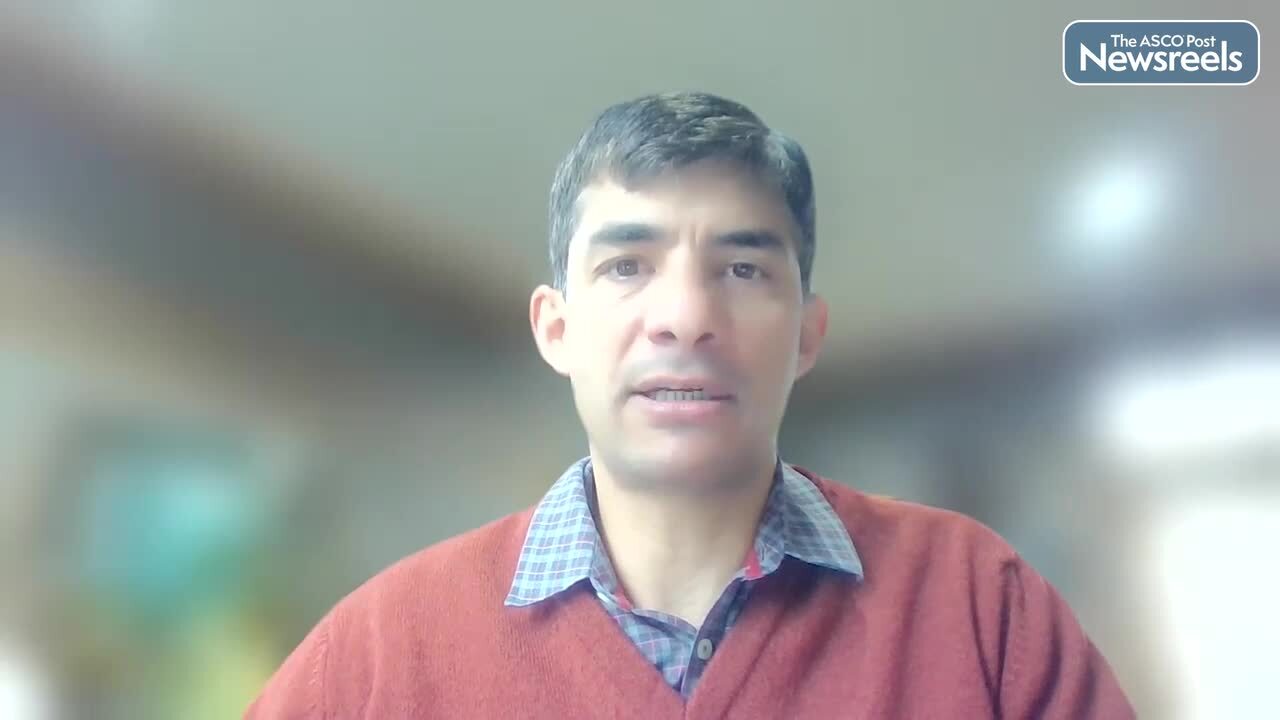Thomas E. Hutson, DO, PharmD, on RCC: Overall Survival Analysis of Lenvatinib, Pembrolizumab, and Sunitinib
2023 ASCO Annual Meeting
Thomas E. Hutson, DO, PharmD, of Texas Oncology, discusses the 4-year follow-up results from the CLEAR study for patients with advanced renal cell carcinoma (RCC). The data showed that lenvatinib plus pembrolizumab continues to demonstrate clinically meaningful benefit vs sunitinib in overall and progression-free survival, as well as in overall and complete response rates, in first-line treatment (Abstract 4502).
Transcript
Disclaimer: This video transcript has not been proofread or edited and may contain errors.
Thomas E. Hutson :
On behalf of my co-investigators, I presented the final pre-specified overall survival from the Phase 3 CLEAR study with nearly four years follow up. The Phase 3 CLEAR study was an international randomized trial comparing Lenvatinib pembrolizumab, Lenvatinib everolimus versus Sunitinib as first-line therapy for patients with advanced renal cell carcinoma.
This data had previously been reported when it met its primary efficacy endpoint, which was improvement in progression-free survival. At that time of that presentation, the secondary endpoints of overall survival and objective response rates were also statistically significant. This resulted in regulatory approval of this regimen and rapid incorporation of this regimen as a major frontline therapy option for patients with advanced RCC throughout the world. This information was also previously published in the New England Journal of Medicine.
Now, with additional 23 months follow up, pleased to report that our overall survival is maintained with a hazard ratio of 0.79, and our other efficacy signals such as progression-free survival and response rate remain robust with this longer follow-up. There were also no new additional safety signals.
So in conclusion, we're pleased to report with additional nearly four years of follow-up the overall survival progression-free survival and objective response rates remain significant and robust when compared with Sunitinib with no new safety signals of the regimen. And Pembrolizumab and Lenvatinib remain a primary therapy for patients with advanced RCC.
Related Videos
The ASCO Post Staff
Shailender Bhatia, MD, of the University of Washington and Fred Hutchinson Cancer Center, discusses phase I/II results on the efficacy of nivolumab with or without ipilimumab in patients with recurrent or metastatic Merkel cell carcinoma. The study found that, for this rare and aggressive skin cancer, nivolumab showed clinical activity in advanced disease. However, these results from CheckMate 358 do not suggest an additional benefit with ipilimumab added to nivolumab (Abstract 9506).
The ASCO Post Staff
Bobbie J. Rimel, MD, of Cedars-Sinai Medical Center, and Kathleen N. Moore, MD, of the Stephenson Oklahoma Cancer Center at the University of Oklahoma, discuss phase III results from the MIRASOL trial, which showed that mirvetuximab soravtansine-gynx prolonged overall survival vs investigator’s choice chemotherapy in patients with platinum-resistant ovarian cancer with high folate receptor-alpha expression. The findings suggest a new standard of care for this disease (Abstract LBA5507).
The ASCO Post Staff
Eunice S. Wang, MD, of Roswell Park Comprehensive Cancer Center, and Gregory Roloff, MD, of the University of Chicago, discuss data that are the first to demonstrate post–FDA approval efficacy and toxicity rates of brexucabtagene autoleucel in adults with relapsed or refractory B-cell acute lymphoblastic leukemia. Although the data may confirm high response rates associated with this agent, they also highlight the need for interventions to reduce associated toxicities (Abstract 7001).
The ASCO Post Staff
Narjust Florez, MD, of Dana-Farber Cancer Institute, and Ferdinandos Skoulidis, MD, PhD, of The University of Texas MD Anderson Cancer Center, discuss results of a biomarker subgroup analysis, showing that sotorasib demonstrated consistent clinical benefit vs docetaxel in all molecularly defined subgroups of patients with pretreated KRAS G12C–mutated advanced non–small cell lung cancer (NSCLC). Although no predictive biomarkers were confirmed, novel hypothesis-generating signals were observed (Abstract 9008).
The ASCO Post Staff
Reid Merryman, MD, of Dana-Farber Cancer Institute, discusses his findings on the regimen of epcoritamab plus rituximab and lenalidomide for patients with high-risk follicular lymphoma. Regardless of whether their disease progressed within 24 months of first-line chemoimmunotherapy, this regimen showed antitumor activity and a manageable safety profile in patients with relapsed or refractory disease. Epcoritamab, a subcutaneous T-cell–engaging bispecific antibody, may abrogate the negative effects of high-risk features (Abstract 7506).





